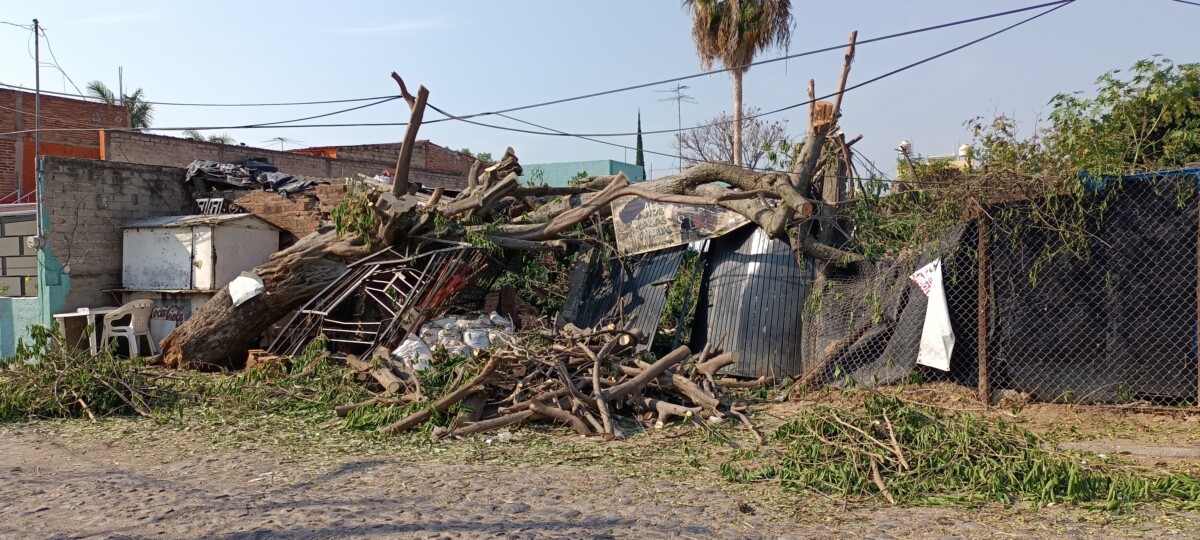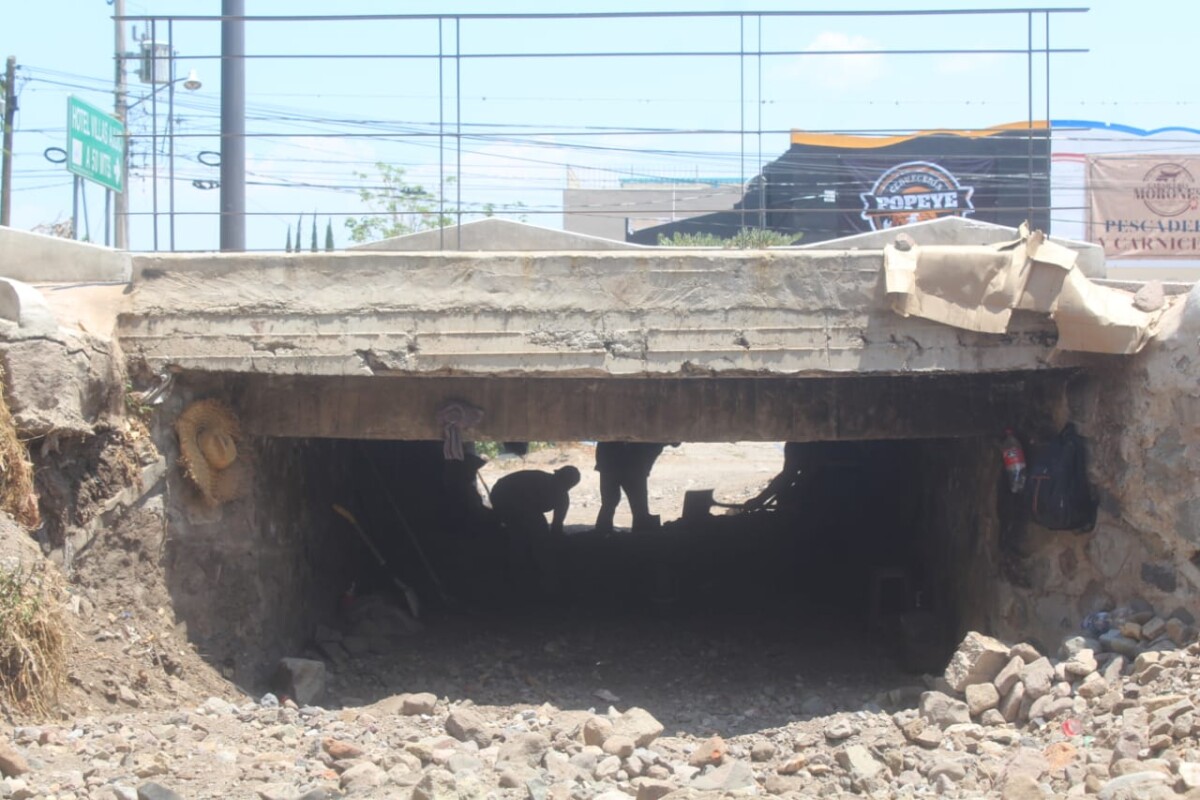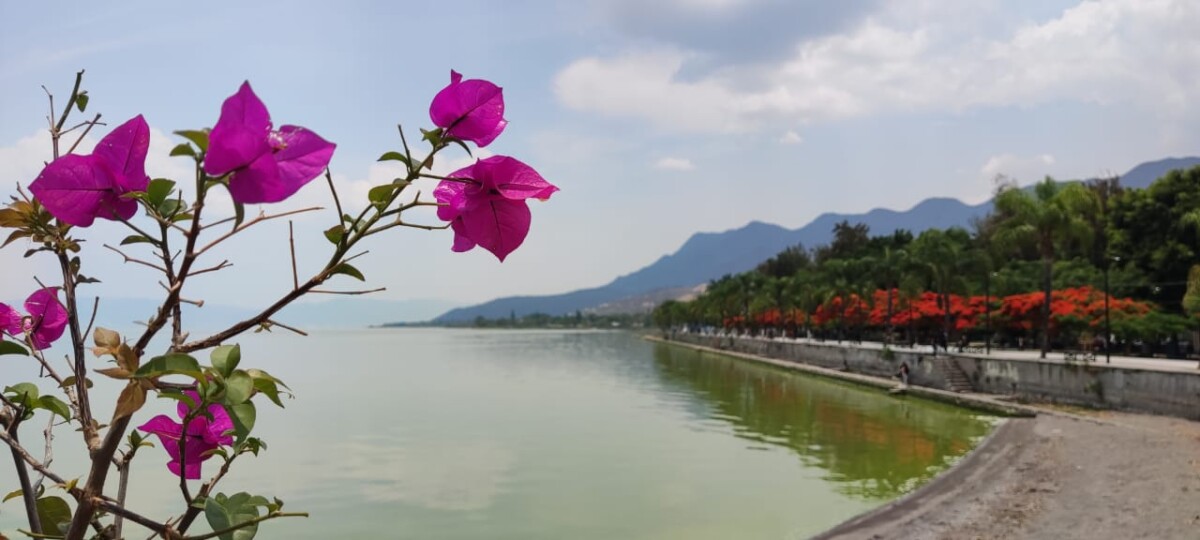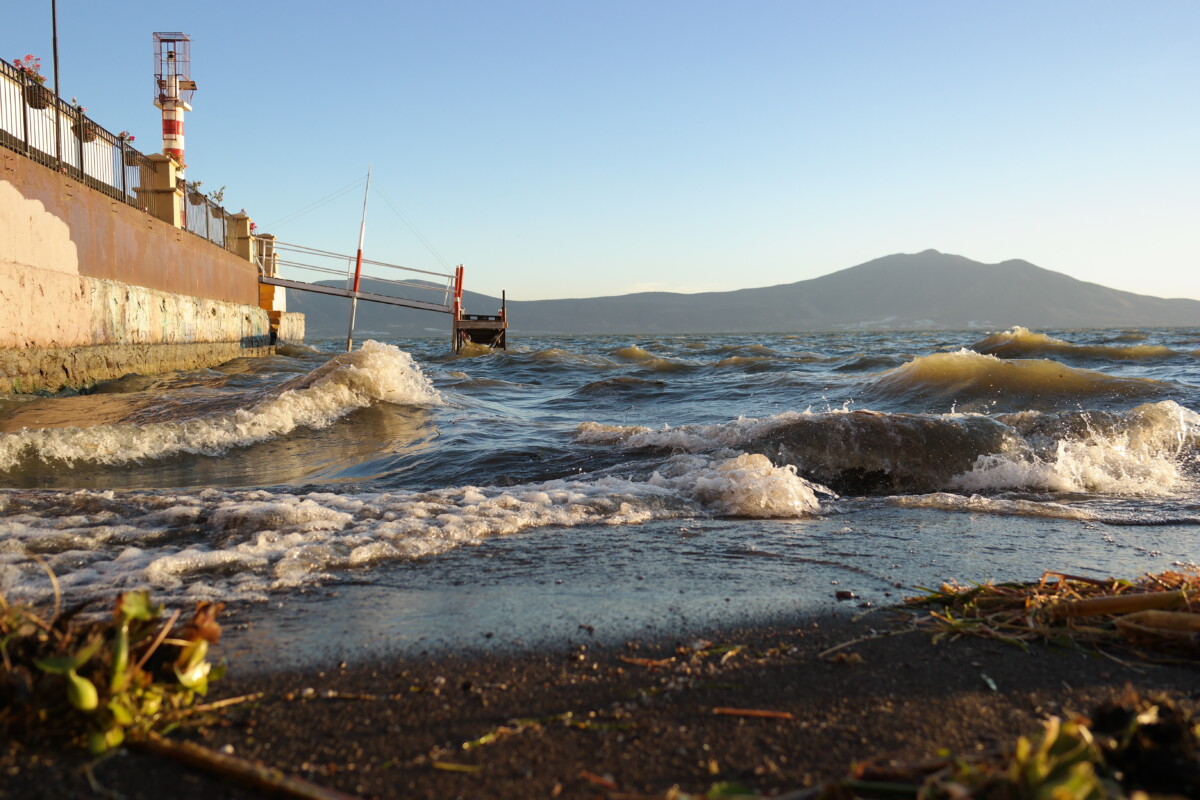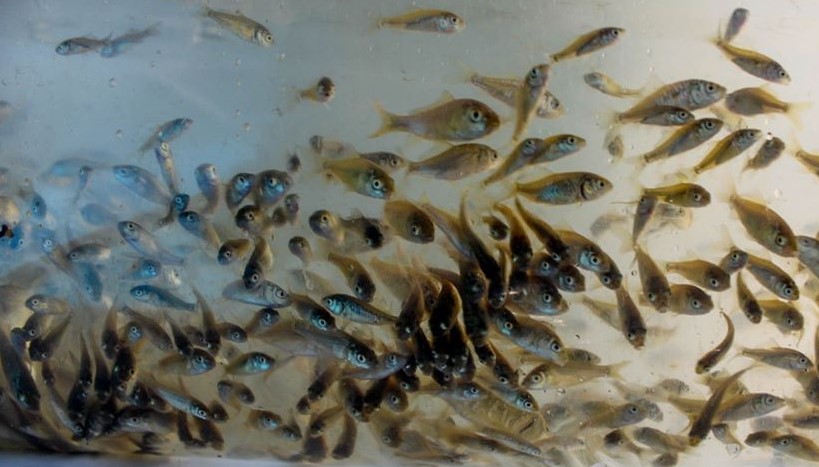ribera
Imparte Proepa curso de capacitación en descargas residuales a municipios ribereños
La Proepa impartió a los municipios ribereños, el curso “Fundamentos y alcances legales de la autoridad municipal en materia de inspección y vigilancia de descargas de aguas residuales”. En la foto una pareja disfruta de un atardecer en el malecón de Chapala. Foto: D. Arturo Ortega.
Redacción.- Con el fin de apoyar los gobiernos locales dentro del Área de Intervención Prioritaria del Río Santiago (Aip), la Procuraduría Estatal de Protección al Ambiente (Proepa) impartió un curso de capacitación sobre la descarga de agua residuales y así dar continuidad a la estrategia Revivamos el Río Santiago.
La capacitación incluyó información sobre legislación federal y estatal, en la cual se señalan atribuciones de la autoridad municipal en materia de aguas residuales, así como Normas Oficiales Mexicanas que establecen límites máximos permisibles de contaminantes para las descargas que se vierten tanto a cuerpos receptores y bienes nacionales, como a redes de alcantarillado urbano o municipal.
El curso busca fortalecer las capacidades técnicas y legales de las autoridades municipales para que el personal técnico y operativo de las áreas y direcciones involucradas en este rubro, conforme a los conocimientos adquiridos, desarrollen habilidades y herramientas que mejoren sus funciones de inspección y vigilancia, llevando a cabo como parte del curso una evaluación diagnóstica previa y una más al final del curso a las y los participantes.
El curso “Fundamentos y alcances legales de la autoridad municipal en materia de inspección y vigilancia de descargas de aguas residuales” estuvo dirigido a autoridades municipales de los ayuntamientos involucrados, así como a municipios que integran la Asociación Intermunicipal para la Protección del Medio Ambiente y Desarrollo Sustentable del Lago de Chapala (Aipromades) y el Instituto de Planeación y Gestión del Desarrollo del Área Metropolitana de Ocotlán (Imeplan).
Al Centro Cultural Metropolitano Ramón Vargas del Ayuntamiento de Poncitlán, asistieron las y los titulares, así como personal adscrito de las Direcciones de Ecología; de Inspección y Reglamentos; Agua Potable y Alcantarillado; Padrón y Licencias, así como los directores de Aipromades, Gabriel Vázquez Sánchez y Luis Arturo Macías García de Imeplan Ocotlán, entre otros.
Schedule 527
First International Theater Festival of Jocotepec 2022
When: April 27 to May 31
Information: Casa de Cultura «José Vaca Flores»
Location: Hidalgo Sur #38, Jocotepec, Centro
Information: 387 763-1621
“Where there is music there can be no bad thing” Book presentation
When: Saturday, May 28 7:00pm
Place: Restaurant Beer Garden, private Francisco I. Madero 200A, Chapala Centro
Benefit for Jonathan Márquez
When: Saturday, May 28 7:00pm
Sale of Mexican snacks, drinks, raffles, brincolin and more. Pozole to go from 1:30pm
Place: Flores Magón #31, La Ladrillera, Ajijic
Rezzonante
When: Sunday, May 29 12:30pm
Voice, piano and saxophone concert
Place: González Gallo Cultural Center, Av. González Gallo 1500, Chapala.
Admission: Free

Diploma in massage techniques
When: Thursday, June 2 3:00pm to 7:00pm
Classroom course taught by Idalia Venegas. It will include massage theory, basic techniques, hot stone massage, modeling massage, and spa wraps, among other techniques.
Cost: Per class $499, registration $1,350
Location: Hotel Sol y Luna, Rio Bravo #10A, Ajijic
Information: 333 952-5562 / 331 723-9678

Musical presentation, Mr. Q
When: Thursday, June 2, 5:00pm
Classic Rock Concert.
Place: 4to Sentido, Carretera Chapala – Ajijic 89, top floor, Plaza Paradise Center, San Antonio
From the Roots: La Tierra
When: Saturday, June 4, 6:00pm to 8:00pm
Art exhibition with cocktails and live music
Place: Sol y Luna Gallery, Rio Bravo #10A, Ajijic

Meeting of harps, psalteries and more
Day: Wednesday, June 8, 1:00pm
Nematatlin musical group
Place: González Gallo Cultural Center, Av. González Gallo 1500, Chapala
Stone Soup
When: Tuesday, June 14, 8:30pm
Fusion rock event
Place: San Antonio Tlayacapan Square
Translated by Paul Weeks
Martha Alcaraz is recognized for more than 40 years of teaching service
Martha Alcaraz at the moment she received the «Manuel Altamirano» award from the Ministry of Public Education. Photo: Courtesy.
Héctor Ruiz Mejía (Jocotepec).- A teacher from Jocotepec received state recognition for her more than 40 years of service in education.
Martha Yolanda Alcaraz Ramírez, the coordinator of preschool education for the municipality of Jocotepec, received the «Ignacio Manuel Altamirano» award from the Federal Education System last Sunday, May 15, during the commemoration of Teacher’s Day.
The award was presented to her by the Governor of Jalisco, Enrique Alfaro Ramírez, and the head of the Jalisco Ministry of Education (SEJ). A total of 1,341 teachers statewide were recognized at the event for having more than 40 years of service.
Alcaraz Ramírez, who assumed the position of coordinator in 1989, said she was pleased with the work that has been done in the municipality at the preschool level, and she appreciated the recognition of her long career as an educator, as well as all the other teachers in the state.
«I want to extend special recognition to all the educators who work to overcome all the problems that have arisen, especially in these times of pandemic,» she said.
In closing, Alcaraz Ramírez told attendees that at 59 years of age, she still has a lot of energy to continue with such important work and that although she is eligible to retire, she assured them that «as long as the body is willing,» she will continue to work in the classroom.
The «Ignacio Manuel Altamirano» award, given to teachers with more than 40 years of service, consists of a gold medal, remuneration and a letter of recognition signed by the President of the Republic.
Translated by Rebecca Zittle
Rain in Chapala left five trees down and a water well blocked
Affectations caused by the guamúchil tree that fell due to the strong winds in Miguel Martínez street in the municipal headwaters. Photograph: Jazmín Stengel.
Jazmín Stengel (Chapala).- Winds of over 50 kilometers per hour in Ajijic and more than 70 (about 43 MPH) in Chapala were recorded for almost 15 minutes during the first rain of the season, which occurred on May 14, around 7:30 pm, according to Civil Protection and Firefighters of Jalisco.
According to reports from the director of Fire and Civil Protection in Chapala, Antonio Lorenzo Salazar Guerrero and the Municipal System of Potable Water and Sewage (SIMAPA), the result of the first rain in the municipality of Chapala was five fallen trees, damage to power lines and obstruction of water well number three.
Of the five trees, two fell in the Atotonilquillo delegation, one at the entrance on the Santa Rosa – La Barca highway and the second at the exit to Juanacatlán, damaging a light pole and telephone cables, which have already been repaired.
Another tree, almost 15 meters (50 feet) high, fell in La Floresta, a subdivision of Ajijic, blocking the road for almost an hour. The Fire and Civil Protection Departments removed it completely.
In the municipal capital, on Emiliano Zapata Street, a tree collapsed and took the perimeter fence of the neighboring land. On Miguel Martinez Street a guamúchil tree fell on the niche of the Virgin of Guadalupe and the gate of house number 480-A, taking down two walls and a metal sign.
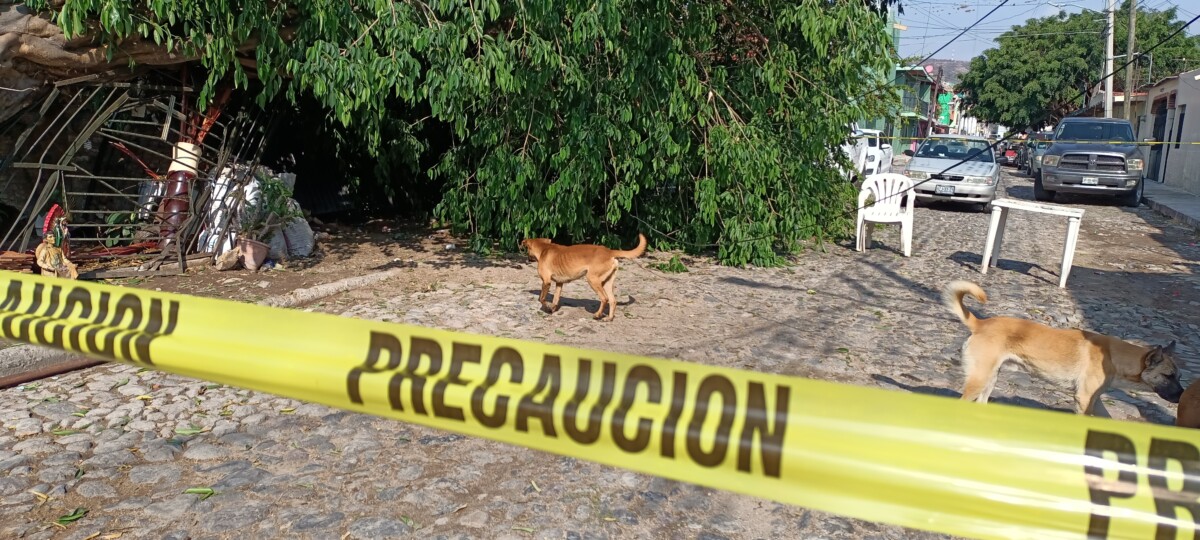
Miguel Martínez street was blocked on Sunday 15 after the strong winds. Photograph: Jazmín Stengel.
Firemen and Civil Protection promised Eliba, owner of the property, that members of the Urban Development Department would come to assess the damage, but a week after the incident they still have not shown up.
In addition, water well number three, located on Teofilo Silva Street, was clogged with sediment, to the extent that only four liters of water per second could be extracted, when on a regular basis it gave 25 liters per second.
At the close of this edition, SIMAPA personnel were re-drilling the well to stabilize the water supply in the Las Redes and Barrio Nuevo subdivisions, located northeast of the municipal capital.
The effects of the rain were also felt in other areas. In school 1066 of Las Redes Chapala, damage was reported to a shade netting structure that was also damaged by the strong winds of the weekend, and was removed by Urban Planning personnel, after an assessment of the structure by Firefighters and Civil Protection.
«Having a municipality rich in green areas also entails risks,» explained Salazar Guerro. Neither Fire and Civil Protection, nor the Directorate of Ecology have conducted a total study of trees in the municipality, to identify how many of them are sick and at risk of collapsing.
Typically, upon receiving a report, the Fire Department and Civil Protection go to the site to diagnose the tree and determine its condition. For this reason, the director of Civil Protection made a request to the public to report to them any type of anomaly in trees in their gardens or public spaces.
Translated by Christalle Dalsted
Clearing of Ajijic bridges and streams almost complete
Bridge near the cemetery being cleaned by hand by delegation personnel. Photo: Sofia Medeles.
Sofía Medeles (Ajijic).-The cleaning and clearing of bridges and streams in Ajijic is about to be finished, said Maximiano Macías Arceo, in charge of the office.
The bridges in the western zone of the delegation are already cleared, and the excavating machines are only giving the «final touches,» he commented.
The bridges that still need to be cleaned include one located between Rio Zula and Tio Domingo, which Macias Arceo defined as critical due to the obstruction it presents. It passes between several houses and runs into a wall at the hotel «La Joya del Lago» which cuts its course. It has already been reported and will be reviewed by the Urban Development Department.
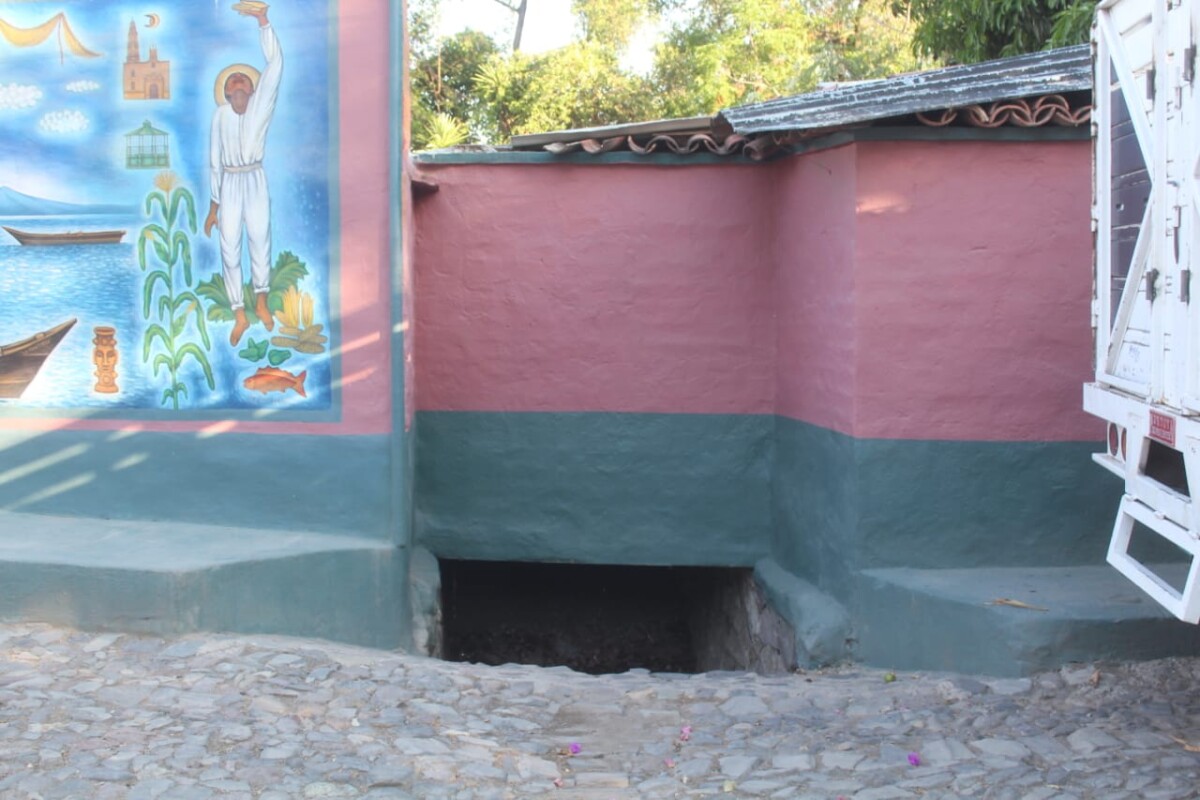
Bridge between Rio Zula and Tio Domingo, which is still obstructed by debris from the mudslides. Photo: Sofia Medeles.
The second is located in the area known as «three bridges,» which only needs the usual drainage since it was not affected by the landslides of last October 2021.
«Most of them have already been cleared, there is still a bit of work to be done, but they are free now, they are ready for the rainy season and will not have any problems,» concluded Maximiano Macias.
However, as of Sunday, 22 May,Laguna observed large boulders and rocks in the underpass at Sendero Christina, which serves several farms and ranches. The area was surrounded by security tape and large piles of debris had been cleared to one side of the road..
A pesar del inicio del temporal, el Lago de Chapala sigue en descenso
Vista del malecón de Ajijic y el lago de Chapala. Foto: D. Arturo Ortega.
Redacción.- Luego de las primeras lluvias registradas en la región lacustre del Lago de Chapala, sigue perdiendo nivel. Hasta la fecha, el lago más grande de México ha perdido 93 centímetros, lo que lo ubica al 63 por ciento de su capacidad.
Del primero de enero al cuatro de mayo, el vaso lacustre pasó del 74.98 por ciento de su capacidad hasta el estado en que se encuentra en la actualidad, es decir, perdió casi 12 centímetros.
Looking at Life in Lakeside:
By Patrick O’Heffernan
The 2000 presidential election was one of the closest and most controversial in US history, and expat votes largely determined its outcome. Everything hinged on Florida where Bush’s lead has shrunk to 300 votes. But in the totals there were hundreds of overseas ballots that had arrived past Florida’s deadline for mail in ballots. Florida election officials rejected these ballots, giving Gore the lead. The United States District Court for the Northern District of Florida famously (or infamously) overturned the rejections, giving Bush Florida with a 537-vote lead and giving him the presidency, based on overseas ballots.
The current election season is now underway as state primary candidates in several states are on the airwaves battling it out. And those primaries are more important than ever because of demographic shifts and gerrymandering. States have redrawn 327 of the US House’s 435 districts in the redistricting process so that only 26 of those districts are considered to be highly competitive. When the court battles are over, that number may rise to 35 competitive seats, meaning that in the remaining 400 Congressional seats, the primary election determines the winner.
So voting now in the primary elections in your state may be the only chance you get to weigh in on Congressional candidates. The same is even more true for the state legislature and is also true for a number of governorships. The lesson is that NOW is the time to register and vote, not in November (do that too!). If you are registered, get your ballot and mail it or email it in. If you are not registered, go to VotefromAbroad.org and register. If you don’t know, go to VotefromAbroad.org and find out. And if you are confused, go to the VoteFromAbroad tent at the Lake Chapala Society Monday morning for all the help you need.
Expat voters can and have determined elections. Now is the time to vote.
Alfaro rules out construction of second Chapala-Guadalajara aqueduct
View of Lake Chapala from the shore of the beach next to the Ajijic dock. Photo: Archive.
Editorial Staff. Jalisco Governor Enrique Alfaro Ramírez ruled out the construction of a second aqueduct to supply the Guadalajara Metropolitan Area (AMG) during his term of office.
«This was my campaign commitment and I stand by it. We are not going to take one more liter from Chapala. We cannot drain the lake to solve the city’s supply problem. That commitment continues. We are not going to build a new aqueduct, but we are going to continue with the maintenance works of the old system,» said the state president.
He made this statement after academics from the Universidad de Panamericana (UP) urged state authorities to inquire about the need to build a new aqueduct to draw water from Lake Chapala.
The governor of Jalisco dismissed this observation by declaring that no more water can be taken from Mexico’s largest lake. The specialist in water technologies, Daniel Sánchez Tapetillo, replied that the second aqueduct would have the function of substituting for the first one in case it failed.
«The second aqueduct is not to take more water from the lake than the Guadalajara Metropolitan Area already has a concession for. To believe that is a mistake. We have a concession of 236.5 million cubic meters a year, that is, 7.5 cubic meters per second. The two aqueducts could never operate simultaneously.»
The specialist assured that, after 30 years of age, the maintenance of the first aqueduct is urgent, because in the event of a failure, 60 percent of the water needed would no longer be supplied. In his opinion the useful life of the current system has already been exceeded.
Sanchez Tapetillo said he regretted that the governor did not listen to the proposals of academics from the University of Guadalajara (UdeG), the Pan-American University (UP) or the Technological Institute of Superior Studies of the West (ITESO), since they are institutions that for years have reviewed the issue and their contributions are to act in time and prevent more than 60 percent of citizens of Guadalajara from running out of water.
Translated by Nita Rudy
New SIMAPA administrator appointed in San Nicolás de Ibarra
Juan Antonio Vázquez Ayala is the new water administrator in San Nicolás de Ibarra.
Jazmín Stengel (Chapala).- The petitions have been heard. Juan Antonio Vázquez Ayala was appointed as the new administrator of the Municipal Water and Sewage System (SIMAPA) in the delegation of San Nicolás de Ibarra, Chapala, at the insistence of the inhabitants.
During the meeting held on April 25 with the municipal president Alejandro de Jesús Aguirre Curiel and a committee of officials, the inhabitants of the town requested the replacement of Santiago García as administrator of SIMAPA and of the spokesperson Ricardo Razo, due to alleged mismanagement of the water and its wells, as well as the making of decisions without consulting the people.
Although the petition issued during the meeting by the villagers wanted Luis Morales Contreras and Irma Reyes Delgado included as part of SIMAPA’s municipal council, other people received the appointments.
Vázquez Ayala was appointed as the new water administrator in San Nicolás de Ibarra and will oversee the documentation, organization, procedures, complaints and recommendations that the population has before SIMAPA. In other words, he will act as an intermediary between the demands of the delegation and the central offices of the municipality.
The appointment of the new spokesperson, who will represent the population in the SIMAPA Council, has not yet been approved. However, the neighborhood committee will decide the new person in charge through a general meeting with the people, stated Vazquez Ayala, who took the opportunity to thank the mayor for his participation and the people for giving him their trust.
Translated by Sandy Britton
Siembran 150 mil crías de tilapia en el Lago de Chapala
Alevines de tilapia en una bolsa de plástico antes de ser liberados. Foto: Archivo.
Redacción. – Como parte del compromiso de la Centro Acuícola Tizapán, integran la primera entrega de parte de la Secretaría de Agricultura y Desarrollo Rural (SADER) Jalisco de donar 500 mil crías de peces para reactivar la actividad pesquera en el lago de Chapala, se entregó el primer lote con 150 mil unidades de tilapia en el Malecón de Jamay.
Durante el evento, la titular de SADER Jalisco, Ana Lucía Camacho Sevilla, observó que esta entrega proviene del Centro Acuícola Tizapán y surge a raíz de la preocupación de los pescadores de Jamay por la disminución en la captura de tilapia, de la cual depende su actividad productiva: “Es la primera parte del compromiso que hicimos”.
Luego de recordar que la Asamblea General de las Naciones Unidas declaró 2022 como el Año de la Pesca y la Acuicultura Artesanales, reconoció el trabajo de quienes se dedican a este oficio. “Por eso vamos a seguir reforzando su labor con crías de peces y con equipamiento para que realicen sus actividades de manera más oportuna”.
El presidente municipal de Jamay, César Celestino Molina Sahagún, comentó que esta entrega es la respuesta de un compromiso de la secretaria, Ana Lucía Camacho Sevilla: “Ella escuchó las necesidades de los pescadores y poco después la tenemos aquí. Esto se agradece y se le reconoce”, no sin recalcar la importancia de fortalecer al sector con el repoblamiento de peces y equipamiento.
María Refugio Hernández, en representación de las cooperativas pesqueras y fileteadoras, agradeció a las autoridades por el apoyo. “Será un impacto fuerte para nosotros. Hasta ahora, con esta administración del Gobierno Estatal, vemos resultados. Estos proyectos serán un bien para todos y mejorará el ingreso para nuestras familias”.
Para saber:
Jamay y Poncitlán son los municipios que cuentan con más organizaciones pesqueras, con 15 cada uno. Chapala y Ocotlán tienen ocho cooperativas, Tizapán seis, Tuxcueca cinco y Jocotepec tiene cuatro agrupaciones de pescadores.
Fuente: https://www.jalisco.gob.mx/es/prensa/noticias/143406
© 2016. Todos los derechos reservados. Semanario de la Ribera de Chapala



